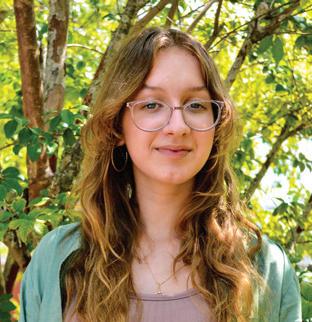DEVIL’S ADVOCATE
The EMERGENCE OF CHATGPT HAS RAISED QUESTIONS REGARDING THE IMPLICATIONs OF ARTIFICIAL INTELLIGENCE ON STUDENTS' LEARNING AND EDUCATION.


The EMERGENCE OF CHATGPT HAS RAISED QUESTIONS REGARDING THE IMPLICATIONs OF ARTIFICIAL INTELLIGENCE ON STUDENTS' LEARNING AND EDUCATION.


Adviser: Larry Knight
Editor-in-Chief: Sarah Hiott
Managing Editor: Ty’Hana Aldridge
Business Manager: Tatum Register
Photography Editor: Denise Soriano
Digital Media Editor: Cameron Kight
Layout and Design Editor: Jillian Williams
Assoc. Digital Media Editor: Sarah Bernardo
Assoc. Photography Editor: Spurthi Nrusimhadevara
Videographer: Carlos Alvarez
Podcast Engineer: Rowan Kershner
Section Editor (Arts & Ent.): AnaSofa Girardot
Section Editor (Features): Samyuktha Sridhar
Section Editor (Opinions): Zoey Larson
Section Editor (Sports): Raza Cottey
Staf Writers: Kendall Ford, Grace Larson, Shravya Nalla, Amani Okero, Cliona Joy Piligan, Katya Sniriova
Staf Photographers: Anusha Anna, Cindy Lam
Staf Artist: Hawi Said
12
Contributing Advocates
The Devil’s Advocate is searching for contributing writers, photographers, artists, and flmmakers. Contact Editor-in-Chief Sarah Hiott at sarahhiott275@gmail.com, Opinions
Editor Zoey Larson at zoeylarson16@gmail. com, or Digital Media Editor Cameron Kight at camikight301@gmail.com.


Ads and Sponsorships
The Devil’s Advocate is dependent on our advertisers and our sponsors. When you purchase an ad with us, it reaches a diverse student population that can help your business. We can also design your ads. Our prices are: $45 (1/4 page), $70 (1/2 page), $135 (full page) $150 (back page). For an additional $5 fee, we can advertise your business on our website or podcast. Contact Business Manager Tatum Register at tatiereg627@ gmail.com or newspaper adviser, Mr. Larry Knight, at knightl1@duvalschools.org.
Twitter: @scpnewspaper
Instagram: @scpnewspaper
YouTube: Devil’s Advocate Newspaper
Facebook: Stanton Devil’s Advocate
Snapchat: @scpnewspaper
Spotify: @scpnewspaper
TikTok: @devilsadvocatenewspaper
Students are utilizing ChatGPT and various AI programs to fabricate essays and school assignments.
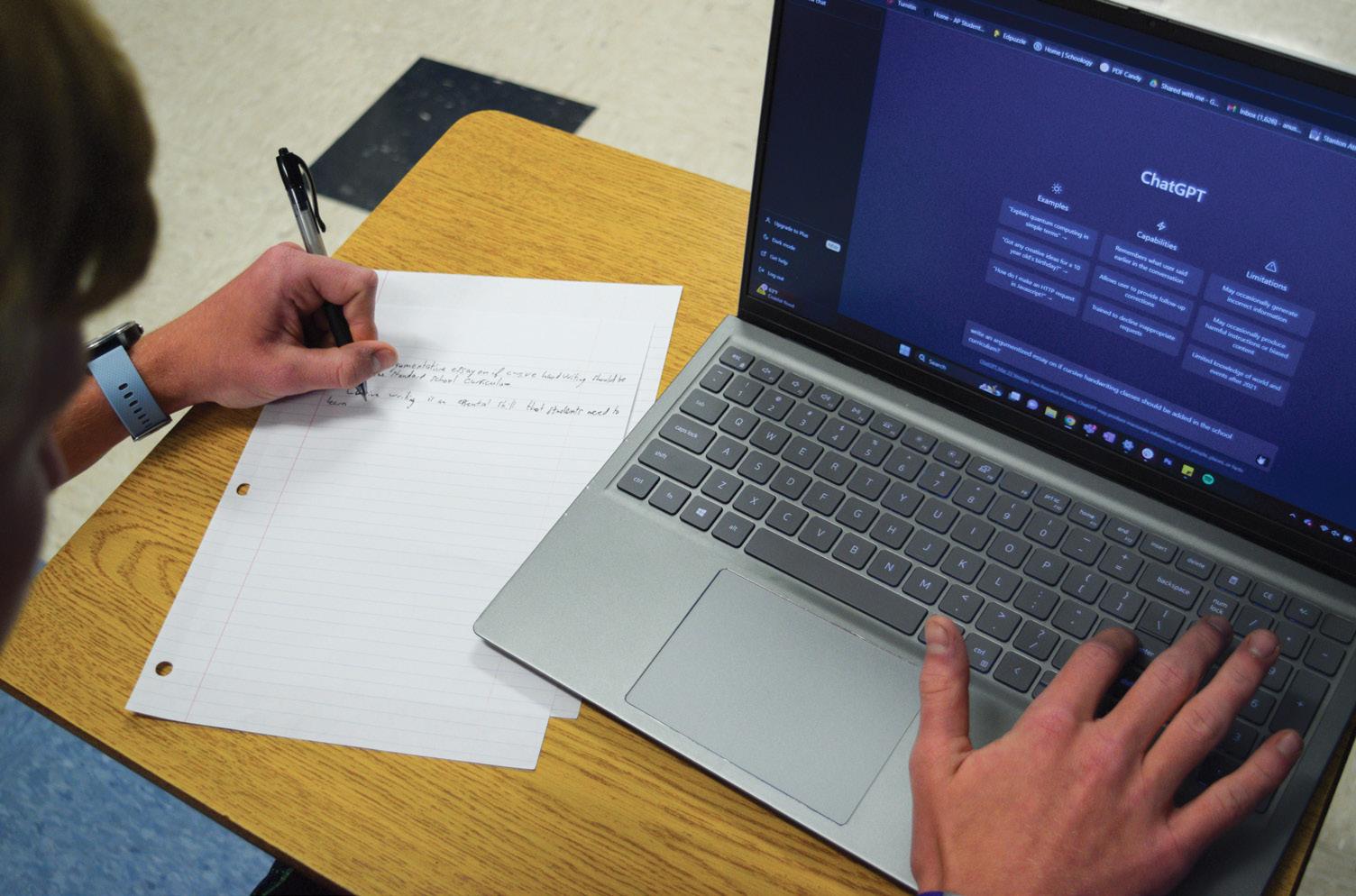
Student Life
4
SELF-CARE
Students share the activities they partake in to manage their stress and practice mindfulness.
Arts & Entertainment
7
STANTON ARTS
Stanton ofers several art programs for students to consider, giving them the creative freedom to showcase their personality and unique talent.
8
SIDEBAR: AN INTERVIEW WITH JULIANA THINT
By Kendall FordAn exploration of Juliana Thint’s time and experiences within Stanton’s music department and beyond.
Features
Opinions
“ENTER PROMPT”
12 The emergence of ChatGPT has raised questions regarding the implications of artifcal intelligence on students’ learning & education.
15
COMMITTED
Six Stanton College Preparatory School student-athletes have decided to bring their game to the next level by playing in college.
SIDEBAR: RECRUITED
To continue pursuing sports in college, high school athletes go through steps of the college recruitment process.
18 THE RISE OF AI
The Editorial Board discusses the risks involved in the rise of AI technology and the harm it presents towards students’ integrity.
19
EXPLORING ADVOCACY: THE WILLOW PROJECT
The Willow Project was recently approved, despite continued criticism from students and activists alike.
THE PROBLEM WITH ACADEMIC VALIDATION
By Katie WongStudents continue to struggle with stress in their attempt to gain academic validation.
ADVOCATE |

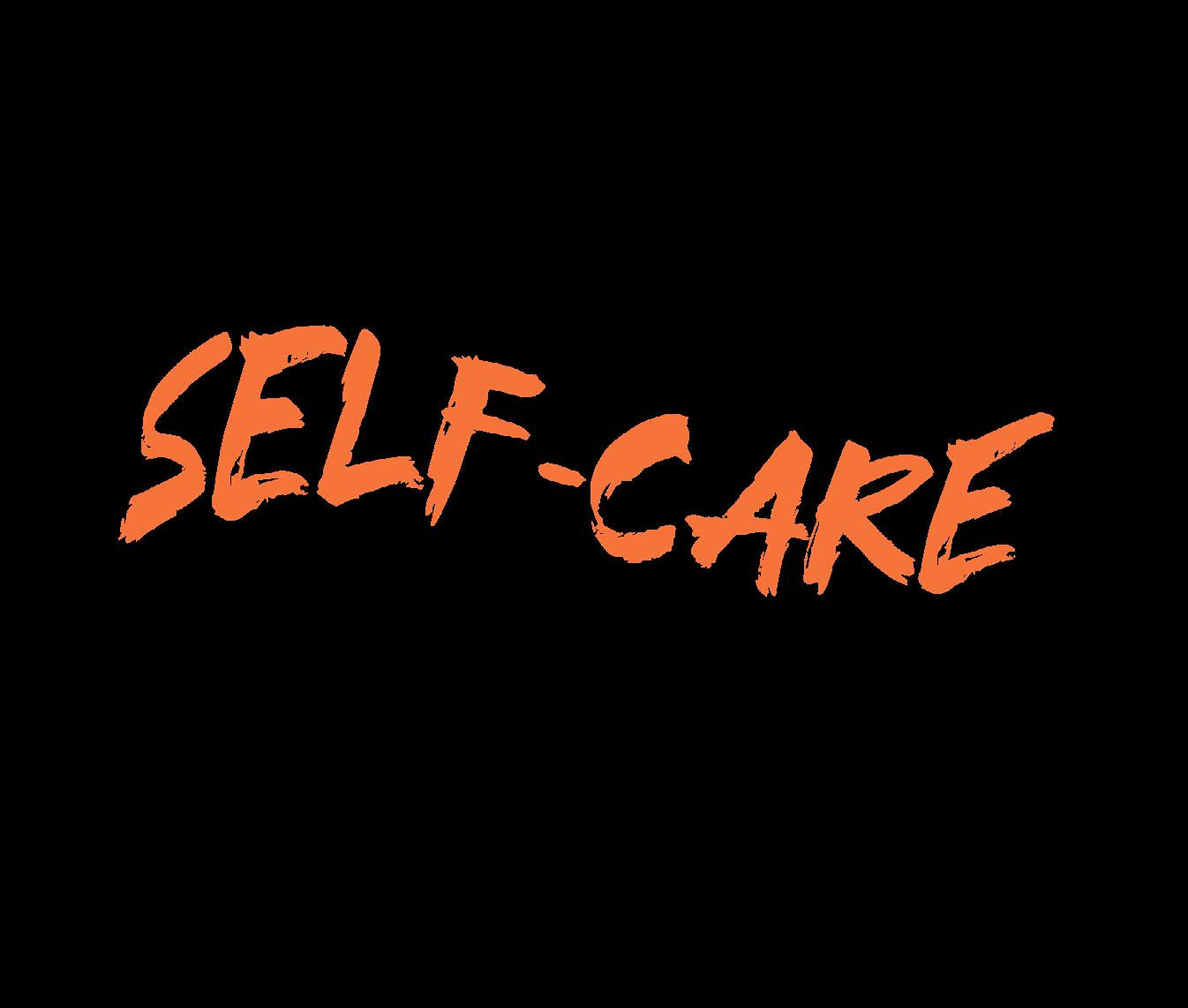 Photos by CINDY LAM, Staff Photographer
Photos by CINDY LAM, Staff Photographer



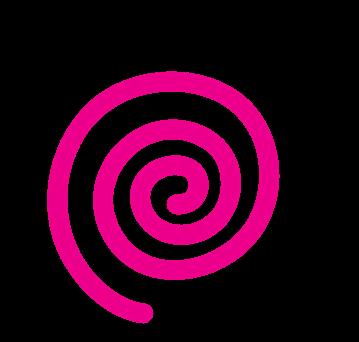
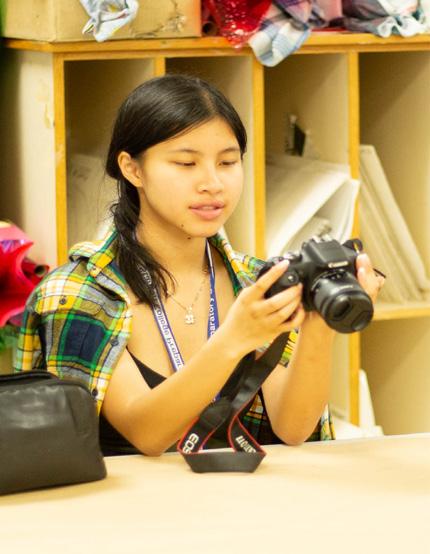 By SHRAVYA NALLA, Staf Writer
By SHRAVYA NALLA, Staf Writer
 Photos by SPURTHI NRUSIMHADEVARA, Associate Photography Editor
Photos by SPURTHI NRUSIMHADEVARA, Associate Photography Editor
From creative artists to experienced singers, academic art programs have given dedicated students a basic foundation to pursue their artistic passions. Stanton College Preparatory School provides students with an opportunity to join a variety of courses and gain an understanding for the fne arts. Through the creative opportunities found in these courses, students can delve into their imaginative side with other like-minded students. While Stanton’s arts programs can be benefcial for those pursuing a career in the arts, people often believe they are underappreciated compared to other academic areas. Although these courses may not be widely spoken about, they can still have a meaningful impact on the student body and the school environment.
At Stanton, arts programs can give students the resources, advice, and knowledge needed to further their artistic pursuits. Stanton ofers various art courses for students to explore, including band, chorus, theater, flm, and visual art. Through these art forms and other activities, such as clubs and concerts, students can use their creative freedom to express themselves and relieve their stress.
Due to Stanton’s academically intense education program, these projects can give students enough time and space to enjoy their hobbies without having to worry about their academic endeavors.
“[Arts courses and clubs] are a way for students to express themselves and de-stress, especially at Stanton because we have a lot of homework,” said sophomore Samaiya Bryant, a former Beginning Band student.
Students such as Bryant believe that arts like music are a frequent type of expression used at Stanton. Given the music courses ofered at Stanton, students with an interest in this craft can obtain a solid foundation in music. They can also encourage students to think critically and be original through the use of any medium. Music classes for
diferent instruments, such as the guitar, can also help individuals think innovatively as it allows the brain to function properly and boosts ideation.
“Students can express their creative side both in performance that includes improvisation which has a creative nature and composition which comes through learning about the structure of music,” said Dale Choate, the Duval County Public School’s Secondary Music Specialist.

Out-of-school activities, such as the Winter and Spring Concert, Band Camp, and the Tri-M Music Honor Society, also allow students to expand upon their talents and gain an imaginative sense for music.
“Art programs and clubs give you the space and time to tell a story and work with other students to really help you express an idea or feeling,” said Junior Isabella Pinedarios, a Band student and former Chorus student. “We are all centered on academics and it is important that we express our feelings in diferent ways.”
While music courses can enhance a student’s cognitive skills, taking theater in high school can improve confdence in an individual. By playing diferent characters in plays, students become expressive and can experience new perspectives. Stanton students can acquire a sense for theater or acting and become well-rounded individuals.
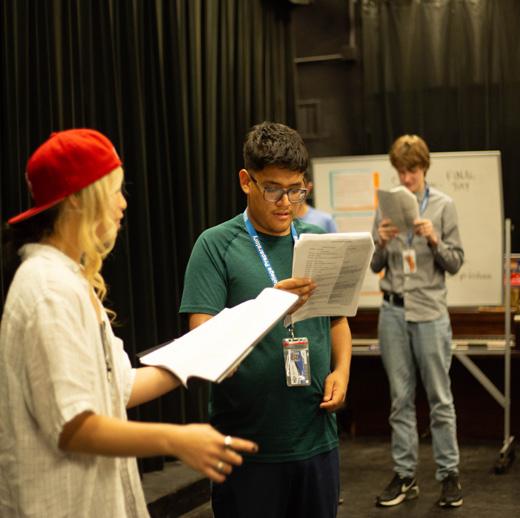
“Theater is not just about performing, it helps us learn how to collaborate with others and it is a great way to learn how to communicate with other people and how to be vulnerable in situations,” said Stanton Theatre teacher Mrs. Aaron Decicco. “It is amazing how playing another character can help you learn more about yourself.”
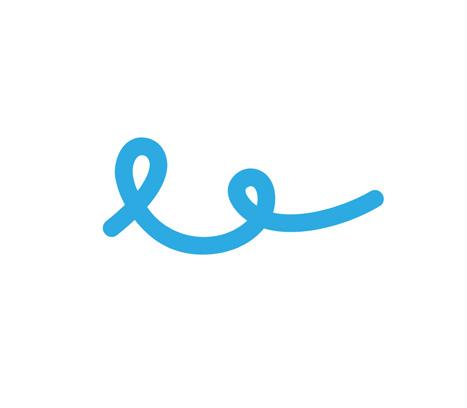
Whether students are analyzing flm history or producing for class, flm is considered an engaging class that enables students to dive into the various aspects of cinema. Since cinema is a broad topic, Stanton presents a variety of flm courses for IB
students. Students in cinema classes like Film 3 Honors often explore diferent cultural perspectives in the flm industry as well as analyze renowned flms that have shaped the modern-day industry.
In IB Film 3 HL, students are exposed to flm knowledge and obtain hands-on experience in flm production. By making short flms, students can improve upon their critical ability and creativity. Senior Celine Taragjini, a current IB Film 3 HL student, is working on a short flm and believes that her perspective on life has changed after taking this course.
“I had a fun time developing flms and being able to [use] the mental images that fash through [my] mind and turning them into flms is really cool, “ said senior Taragjini.
Similar to flm courses, art education gives students the creative means to convey their emotions. These classes present students with enough resources to create meaningful artwork while also developing problem-solving and criticalthinking skills. They also allow for relaxation as art projects are often considered meditative activities.
“In Pre-IB Art 1 class, we cover all the mediums, all the techniques, and include a lot of art history, and so [the students] are really getting a full education of everything that they would need for art,” said art teacher Mr. Tony Wood. “No matter which area you want to go into, you still use the same principles and elements of art and design.”
Arts programs make Stanton’s education system more well-rounded and provide students with various benefts, preparing them for any career involving the arts. Although arts programs may not be spoken about often, they are considered to be an outlet for creative expression and are important for students with artistic passions. As students join these programs, they hope to capture a gifted understanding and a unique experience in the realm of arts.
Junior Bo Rose directs the practices of their latest in-class production.
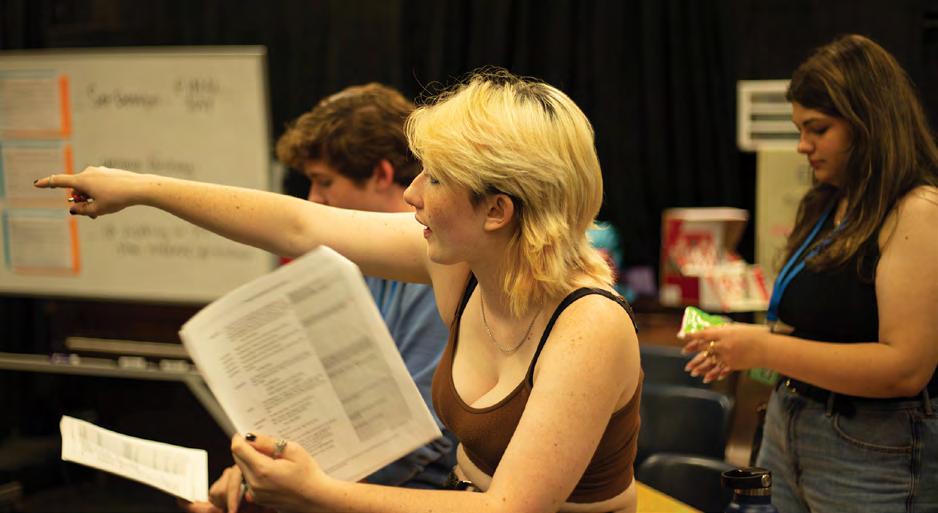
Preparing a winter-themed photography project, students in Mr. Wood’s Digital Art class use contrasting light for their shoot.

Stanton’s award-winning Chorus class performs a song at the latest Spring Concert.

Students in Ms. Santa Lucia’s Visual Art class work on their latest pieces.

 By KENDALL FORD, Staf Writer
By KENDALL FORD, Staf Writer
How were you first introduced to music?

I told my parents when I was four years old that I wanted to become a rock star. I have absolutely no idea where that dream came from, but one month later, they signed me up for piano lessons and ever since, I have been given music opportunities through school.
What motivated you to join Stanton’s music program?
In eighth grade, Mr. Peters, the current Stanton band director, made rounds to all the feeder schools. And me being an alum of Julia Landon College Preparatory School, he came to Landon to talk about the Stanton music program and introduce the idea of marching band.
How would you say you have mentored other people?
I would like to say that I hopefully departed some of the knowledge that I’ve gained from the amazing directors that I have gotten to work with over my years of being a musician.
As a senior, how do you envision your future in the music world?
I am planning to major in music, specifically I’m looking to get a Bachelor’s in music education first, which is a four-year degree like most others. My main goal is to become a music instructor of some sort. I would love to do high school band directing.
LISTEN TO the full INTERVIEW HERE!




“Over the past few years, technology has progressed to a point where it has become more sophisticated and has taken on characteristics that resemble those of humans. Some people have taken advantage of this capability by using it for their own beneft.” At frst glance, this quote may appear to be authored by a human; however, it was generated by a popular online chatbot known as ChatGPT. The software is wellknown for its ability to produce text that features a human-like tone. The website, considered a breakthrough in modern technology, has attracted a large crowd of users, including students at Stanton College Preparatory School. It is frequently used to produce classwork, replacing individual thought with automated responses. Students expect the bot’s work to appear similar to their own, though the diference has been noticed by educators worldwide. As more students begin to use this technology, individuals worry about its implications on education. When talking to the bot, students can enter various prompts, requesting a response written in diferent tones. Its use of varying styles makes it more advanced and human-like than its predecessors. High school and college students alike can manipulate ChatGPT, using specifc commands to get the chatbot to complete assignments on their behalf. This work is completed in minimal time, making it more convenient for students who are looking to cheat. Educators fear this will have negative implications on students’ learning by hindering their creativity and promoting laziness.
“When we begin to search for information from other sources, we can start to lose our own voice,” said Mrs. Holly Lanham, Director of Technology Innovation for Duval County Public Schools. “If we begin to rely on tools such as ChatGPT to produce our work [and] give us guidance, we begin to lose ourselves.”

DCPS personnel are wary of the progression of AI, fearing new advancements like ChatGPT will lessen the quality of students’ work. By using AI to respond to their classwork, students begin to lose their individual style and tone. Wishing to see the progression of their students’ skill, instructors, like those at Stanton, are frustrated by their use of the chatbot. They feel steps must be taken to resolve students’ misuse of modern technology in classrooms.
“Teachers, schools, and districts need to develop techniques and policies for dealing with ChatGPT and AI because the future will hold even greater reliance on such sources,” said Stanton English teacher Mrs. Maura Donoher.
In addition to frustration felt by teachers, similar emotions have been experienced by those working in the tech feld. Chris Caren, CEO of Turnitin, a website that checks students’ work for plagiarism, is developing software that can detect the use of ChatGPT in assignments.While the company acknowledges the benefts of using such technological advancements in a school setting, it also mentions its eforts to combat inappropriate use of the website.
According to a statement on Turnitin’s website, the company believes “AI can be a positive force that, when used responsibly, has the potential to support and enhance the learning process.”
Not only is ChatGPT frequently used in a school setting, it is also apparent in the creation of modern art, damaging the authenticity of art
ChatGPT has raised questions regarding the implications of artificial intelligence on students’ learning.
itself. Whether it be a piece of writing or a drawing, art is based on the individuality and creativity showcased by its creator. When technology is implemented in the artistic process, it uses pre-existing works of art as reference. Developments like OpenArt have sparked controversy among users, who feel the program violates the ethics of art and technology. Opponents fear the program will have grave implications on creativity, as it threatens the originality of modern
art. The division on such topics has caused a struggle between those looking to defne the limitations of AI.
“[Art] should be unique to [each] person,” said sophomore Ria Adake. “I do not think it is ethical to use artifcial intelligence for things that are supposed to represent your creativity.”
In this new technological era, people have struggled to reach a conclusion on the ethics of using ChatGPT. Users and teachers fnd it challenging to defne how the chatbot

should be used. The International Baccalaureate Program is among the frst to draw conclusions on its proper use.
“The International Baccalaureate has decided it is not ‘banning’ the use of ChatGPT or any similar AI software as has been seen elsewhere; this is the wrong way to deal with innovation,” said Dr. Matthew Glanville, Head of Assessment Principles and Practice, in a statement on their website.
The IB program allows students to use the bot as a research tool they can cite in their essays. Some are shocked by this decisions, while others believe it is an ethical way of dealing with newer developments in technology.
IB students like senior Jennifer Chen, President of Stanton’s Robotics Club, often share this same sentiment.
“As long as students do not use it to do all of their work, but rather use ChatGPT as a way of helping their writing, it would be helpful for education,” said Chen. Certain users feel ChatGPT can be used ethically in a school setting,
arguing it has great benefts as a research tool. Its impact on students depends on how they choose to use the software, meaning it can have both positive and negative efects on their work. Sophomore Jaan Thacker feels one beneft of ChatGPT is its ability to gather information on a subject, helping students draw a conclusive outline on a topic before beginning a paper.
“[ChatGPT] is useful for giving you a general outline of what you have to do,” said Thacker. “It does not always give you the most correct answer, but it is a starting point for research and fguring out what you have to do.”
Not only do supporters consider it a useful research tool, they also feel it can be used to review papers before they are submitted. Proponents of the chatbot claim it promotes a deeper level of intelligence by allowing them to focus on enhancing the quality of their work, rather than detecting small errors. Users may rely on ChatGPT to catch minor mistakes in their writing, allowing them to spend more time on
“ChatGPT and AI may infringe on intellectual and artistic property of writers and artists.”
With the rising accessability of softwares like ChatGPT, human dependency on technology rises.
the content of their work. Others argue against this claim, stating the option promotes laziness among its users.
“Some people [are] dependent on AI for a lot of things,” said sophomore Avishka Fulgavkar. “People [do not] want to do their own work, [and are] less efcient and creative. They will [turn] to AI for anything.”
People like Fulgavkar feel it makes users more reliant on the software, creating a false sense of dependency on the bot. Though users regard this as more efcient, it can also hinder their revision skills by allowing them to use the chatbot to further the accuracy of their work. Not only do people feel the website has grave implications on the educational department, they also worry about its efect on society as a whole. Beginning less than a century ago, AI was a minimal force that barely impacted the lives of individuals. Now, modern devices and systems pose a greater threat to society.
According to an article published by Harvard University in 2018 titled, “The History of Artifcial Intelligence,” scientists and programmers in the early 20th century hoped to create a robot that used human-like critical thinking skills to solve problems. This task was frst achieved by Allen Newell, Clif Shaw, and Herbert Simon in 1956 with the invention of the Logic Theorist. Regarded as the frst artifcial intelligence program, the Logic Theorist was the frst computer program designed to perform automated reasoning. Its release strengthened the public’s faith in technology’s ability to mimic human nature. For decades, scientists made advancements that foreshadowed the emergence of emotionally -intelligent robots. The most recent success in nearly a century of developments comes from OpenAI’s release of Sam Altman’s ChatGPT in November 2022. Since then, individuals have questioned the chatbot’s efects on society, including
For years, there has been speculation that robots may take over the workforce, but with the emergence of more human-like devices the idea has grown more feasible. As technology begins to mimic human intelligence, individuals have grown wary of robots inheriting pivotal roles in society.
“[Technology] could bypass our understanding of it if we do not deal with it in the correct way,” said junior Luke Tattersall. “If we are smart enough, we will [never] replace software engineers with AI. But the fact that [ChatGPT] is easily accessible to everyone means we are very close to having robots replace jobs.”

Business owners can employ the use of the chatbot to debug coding and create websites. Entrepreneurs regard this as a cheaper, more efcient alternative to hiring formal programmers. Some consider this to be positive, as it would make the workplace more proactive and accomplished. However, it also threatens the position
various individuals, promoting the rise of unemployment. People fear as the device adopts more human-like processes, jobs will be taken over and robots will be responsible for the declining state of society.These speculations have made users wary of the rapid development of technology.
Modern advancements allow AI to assist the general population with simple, everyday tasks. Advancements like ChatGPT have alarmed individuals, who feel this will have negative implications on society’s creativity. Others fear it may lead to a future controlled by technology, where computers have outsmarted humans. Supporters of more developed technology praise its human-like qualities. Though ChatGPT garners mixed reviews, it depicts a growth in the quality of artifcial intelligence. Growing sentiment indicates that technology can be used for both good and bad, depending on how society chooses to use it.



As the school year comes to a close, seniors at Stanton College Preparatory School are beginning to make their fnal decisions for college. Stanton has a history of student athletes committing to play their sports in college, and this year is no diferent. This school year, six seniors have remained dedicated to their lifelong passion and have decided to continue playing at the college level. While getting into college is an accomplishment on its own, getting recruited for a sport is a dream very few athletes ever realize.
One athlete who has achieved this honor is senior shortstop Cole Durham, who is committed to Tallahassee Community College and has been playing baseball since he was four-years old.
“My brothers played [baseball], and I grew up around the ballpark with my dad. So, I decided to try it out, and I [have] loved it since then,” said Durham.
Durham has been playing baseball for 14 years and has always had encouragement from
By AMANI OKERO, Staf Writerhis coaches. During his middle school years, his coach said Durham has the potential to play professionally. This coach also inspired him to keep going through the tough commitment process, and work throughout his summer and overcome being undersized for high school baseball.
“Once I came to high school I realized I was willing to work hard and I really wanted to play varsity baseball,” said Durham. “Throughout my freshman year I worked hard on getting bigger, improving my skills, and being able to start on varsity my sophomore year.”
Similar to Durham, senior Madison Mina, was also inspired by her coach. After beginning her volleyball career in high school, Mina worked hard to be recruited and is now committed to The Milwaukee School of Engineering.
“I seriously thought about being recruited in my sophomore year [and] was motivated by my frst club season coach who helped me grow out of my shyness,” said Mina.
With Mina’s coach teaching her faster attacks and blocking skills needed for college, she gained more confdence in her volleyball skills. She then started connecting with diferent colleges that fulflled her interest in engineering along with her passion for volleyball. From editing sports clips, to emailing various colleges, Mina was diligent in keeping her recruiting profle updated.
“Milwaukee School of Engineering was one of the schools I targeted due to its academic status,” said Mina. “[The head coach and I] have been emailing and phone calling throughout my junior year in club [volleyball]. After watching me play in real time, I was ofered a position on the team.”
Alongside Mina, senior track runner Zahir Miller who is now committed to Florida State College at Jacksonville began her recruitment process in the 10th grade. Running started as a way to condition herself for swimming, but after Coach Norah Betancourt saw Miller’s potential, Miller joined cross-country and grew a passion for the sport.
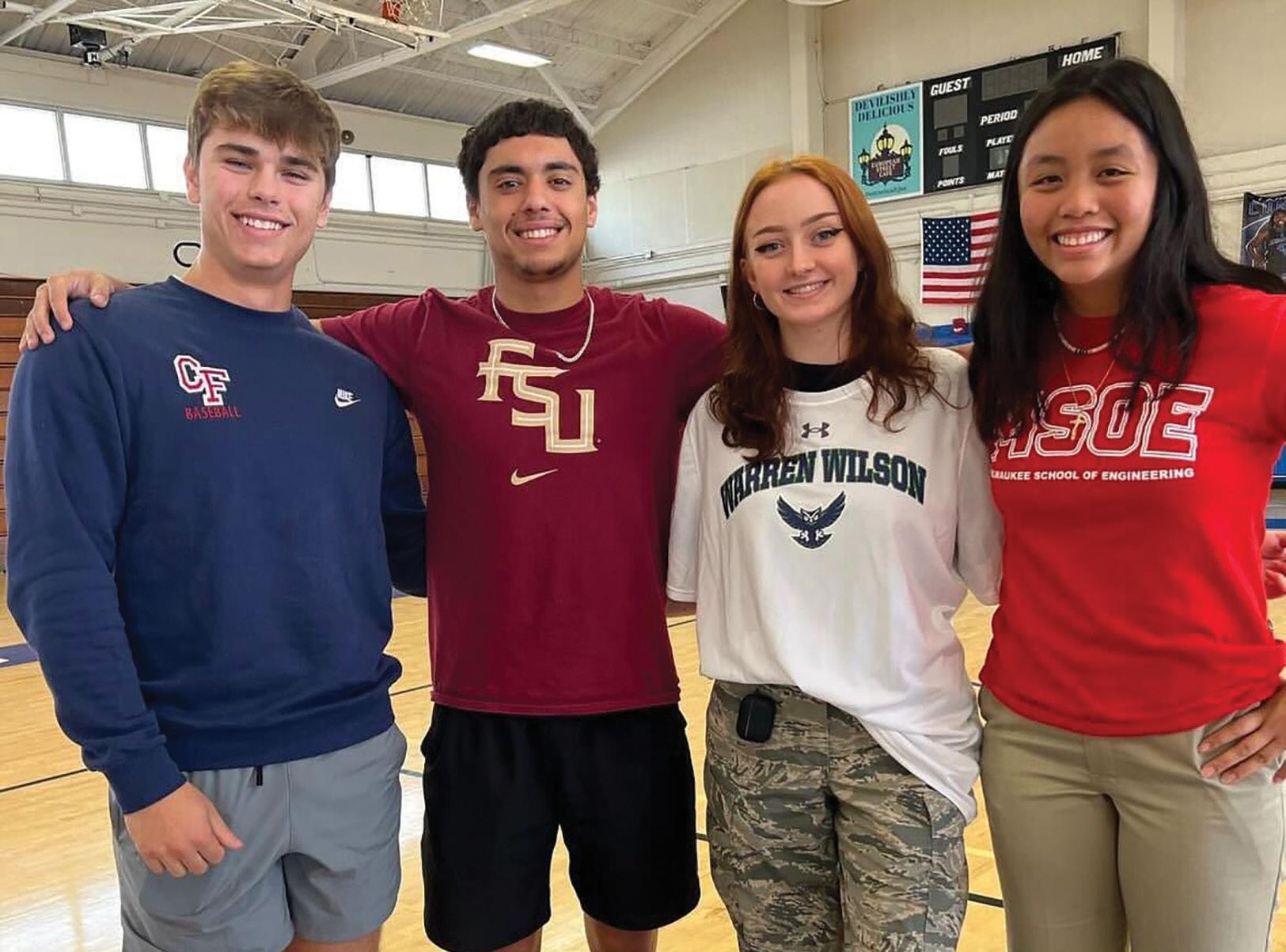
“She came out and did a 5K and I think she fell in love with distance running a little bit more and the rest is history,” said Coach Betancourt.
With Miller on the team, Coach Betancourt was determined to help her endurance and passion for the sport. While balancing school and sports was not easy, Coach Betancourt made Miller’s recruitment less complicated by connecting her to resources and coaches around the state and country.
“The most stressful aspect is that if you have an athlete who wants to continue[in college], is trying to fnd a good [coach]for that person,” said Coach Betancourt.
Coach Betancourt also helped her narrow down the list of colleges to those including a pathway to pre-law. While Miller was scared at frst, she grew more inspired to continue the commitment process after receiving interest from colleges.
“But as soon as I had coaches emailing me back, I could tell that putting yourself out there is really all it takes,” said Miller.
Senior swimmer Mehdi Elafouir, Miller’s teammate, has been swimming since he was young. His high work ethic, disciplined practice schedule, and dedication to the sport helped achieve great success during his commitment process. He is now committed to Florida State University and through the early morning and late night practices, he remained devoted to achieving his goal of swimming in college. However, like all athletes, Elafouir faced mental setbacks.
“I have and wanted to quit,” said Elafouir. ‘‘What [kept] me motivated is wanting to give my family
the best life possible because of everything they sacrifced for me.”
Elafouir’s family has been his main source of motivation to continue pushing through the mental stressors. He also reported that his biggest goal is to compete in the 2024 Paris Olympics, representing Morocco and making his family proud.
Elafouir was not alone in persevering through self doubt while navigating his difcult recruitment process to achieve his dream. Senior baseball player Andrew Stancin also faced obstacles. Stancin has played the sport for more than half of his life and has sufered multiple injuries that afected his recruitment process and performance.
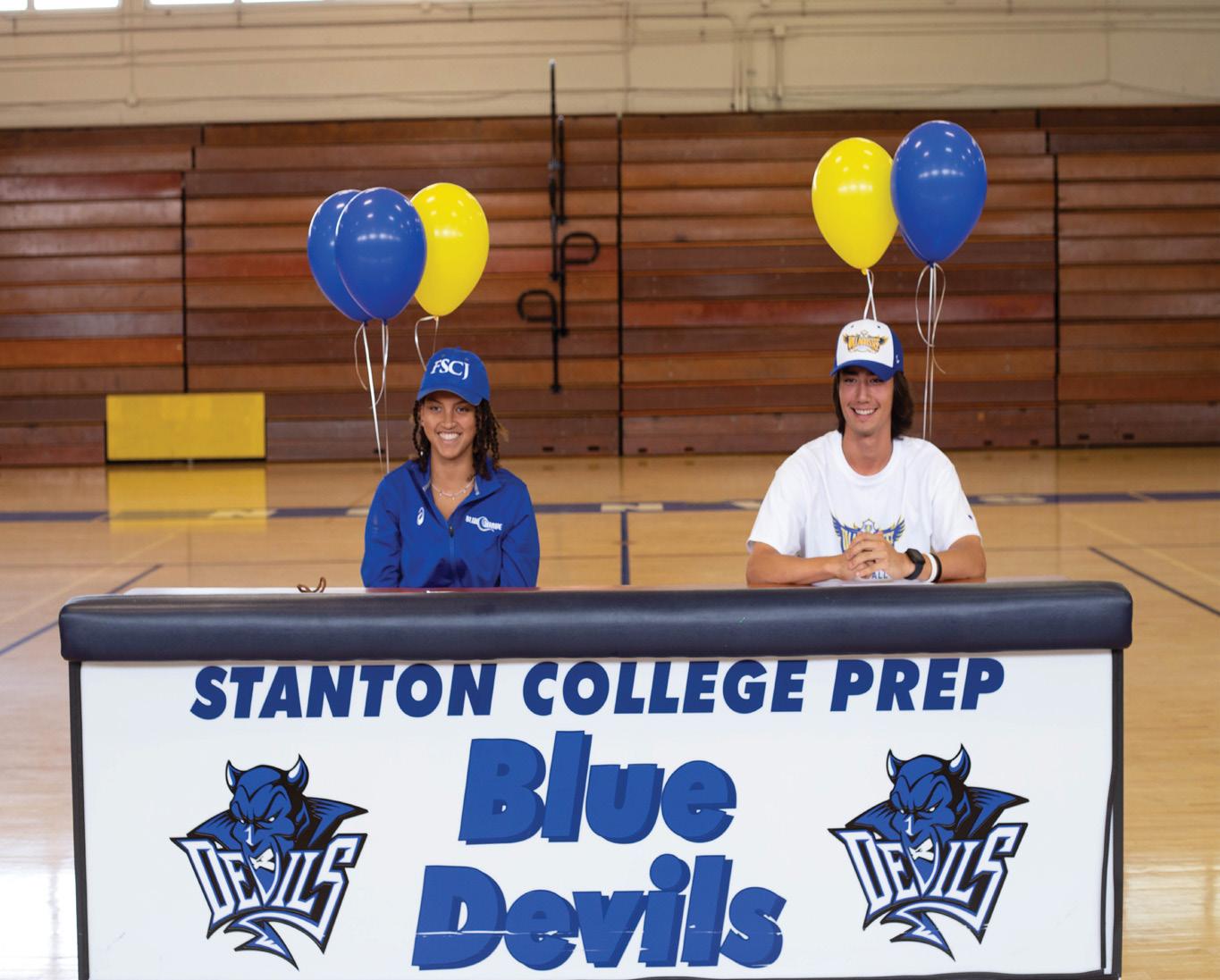
“I was not able to play summer ball because I broke a bone in my right hand, and tore my UCL,” said Stancin. “That set me back because a lot of recruiting happens in the summer.”
While it is difcult to overcome injuries during the recruitment process, Stancin remained determined to reach his goal. Through months of recovery,
Stancin reminded himself that everything happens for a reason and has a purpose. He also decided to turn that negative energy into motivation to come back stronger than ever.
“My injuries were more like a comeback thing for me. I was determined to come back even stronger,” said Stancin, who was always determined to play college baseball and knew everything was going to work out for him. “I was going to play college baseball no matter what. I just needed to decide where,” said Stancin.
Through all the stressors, mishaps, and self doubt, along with their school obligations, these six seniors have managed to weather the commitment process in order to achieve an honor few athletes ever do. None of these student athletes would have made it this far if it was not for their hard work, dedication to their sport, and burning passion. These athletes prove that while few high school athletes get to continue their passion for sports after graduation, it is still achievable.
As the 2022-2023 school year approaches its fnal quarter and college admissions are announced, dedicated senior athletes are faced with the choice of continuing sports after graduation. On the collegiate level, athletes surpass the competition through their work ethic and diligence. For students who decide to undergo the college recruitment process, there are steps and requirements students follow to prove their capability of being a college divisional athlete
Before recruitment, college athletic conferences such as the National Collegiate Athletic Association (NCAA) advise athletes to research and choose a division level. In the NCAA, divisions are divided into Division I, Division II, and Division III, with Division I being the most competitive. Unlike NCAA Division I and II, Division III is exempt from athletic scholarships and NCAA requirements. Recruiting organizations have outlined steps to assist student athletes in the recruitment process.
Coaches at Division I and II schools may follow this process: gathering a list of athletes, sending recruitmenting letters or camp invites, conducting evaluations, ofering scholarships, and then signing athletes. According to the recruiting platform Next College Student Athlete (NSCA), coaches identify potential recruits who meet criteria such as height, weight, position, location, and academics.
After fnding potential recruits, coaches send out surveys or questionnaires to evaluate an athlete’s interest in their program. These questions may request knowing an athlete’s experience with a sport, GPA, and SAT score. To answer these surveys, athletes can initiate
in-person visits with recruiters or create a highlight video. In these videos, student athletes showcase game footage to be reviewed by coaches. Stanton football coach Mike Healey uses the video service Hudl to create highlight videos that display the abilities of football players to recruiters.
“Speed, strength, toughness, playing the whole game even when they are tired, and stamina; those things would change by position,” said Coach Healey.
Once having a list of their top prospects, coaches will begin making scholarship ofers and lock down commitments. Some athletes may receive these proposals early through verbal ofers, indicating the possibility of being accepted for a roster spot. Coach Healey, who knows football college recruiters, may send highlight videos to be reviewed by a head coach.
“I would send the flm online. [Recruiting coordinators] will send it to their head football coach, and if the head coach approves, they will start providing an ofer,” said Coach Healey.
If the athlete decides to attend the college from which the ofer came from, they can verbally commit to the institution. However, ofers are not ofcial until the athlete signs a National Letter of Intent (NLI). By signing an NLI, athletes commit to attend the college for an academic year, and are eligible for athletic fnancial aid depending on their division level.
While recruiting platforms provide steps and services to prepare student athletes for collegiate sports, factors such as interest, talent, and academic requirements may afect a student’s decision to commit. To appeal to college recruiters, student athletes may complete questionnaires or create highlight videos with game footage as an attempt to get recognized. To student athletes, the college recruitment process is the next step in pursuing sports after high school, and can assist an athlete in establishing a professional career in the future.
“What keeps me motivated is wanting to give my family the best life possible because of everything they sacrificed for me.”
— Mehdi Elafouir, 12th
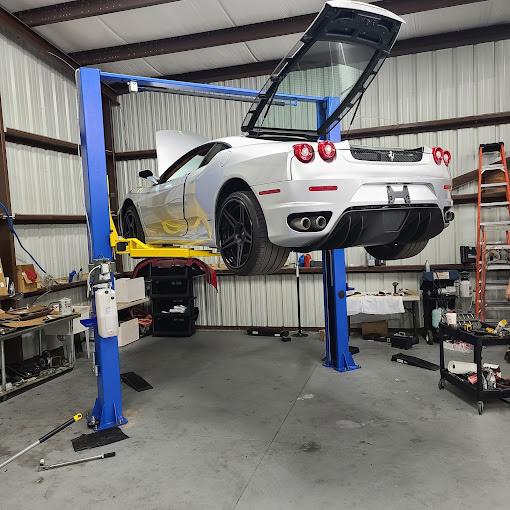


Ty’Hana Aldridge
Tatum Register
Cameron Kight
Denise Soriano
Jillian Williams
Editor-in-Chief Managing Editor Business Manager Digital Media Editor Photography Editor Layout and Design EditoriiiiiThe Devil’s Advocate serves as the ofcial newspaper of Stanton College Preparatory School. It is produced quarterly by members of the Journalism class. The editors reserve the right to edit any material submitted into the paper for content, grammar, length and accuracy.
iiiiiThe Devil’s Advocate is a public forum for student expression, which encourages free exchanges of opinions concerning controversial and noncontroversial community and school related issues. The advertisements and ideas expressed within the newspaper are not necessarily those of the newspaper staf, Stanton administration, or the Duval County Public School Board.
iiiiiThe Devil’s Advocate accepts advertisements from all businesses in the Stanton community. The ad contract can be given to a staf member or newspaper adviser Mr. Larry Knight.
iiiiiReaders may contact any staf member or the adviser at (904) 630-6760 or at knightl1@duvalschools.org.
In this issue’s cover story, “Enter Prompt,” staf writer Grace Larson addresses the growing dangers of artifcial intelligence in schools, especially regarding integrity violations from using AI websites. Not only do these chatbots limit the span of human creativity, they also present an ethical challenge to the Integrity Code. Stanton College Preparatory School is known for its high academic standards and its Integrity Code, which forbids giving or receiving any information regarding assignments and assessments. With new technology such as ChatGPT providing a convenient way of receiving answers, websites are developing new means to detect cheating on platforms like Turnitin. The responses generated on ChatGPT sound like those of a human and are done within seconds, seemingly undetectable. Teachers remain vigilant when searching for any forms of plagiarism or integrity violations and are now voicing a need for updated verifcation on Turnitin. If students are found using these websites to plagiarize, they are immediately eligible to receive an integrity referral. This can be detrimental to a student’s college resume as it leads to expulsion from honor societies and must be reported to universities during the application period. It is important for students to remain aware of the penalties for cheating and avoid websites like ChatGPT.
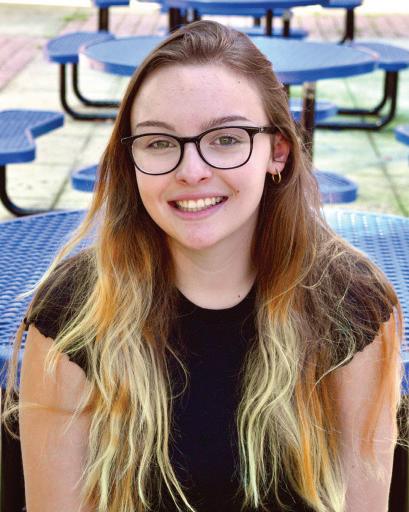
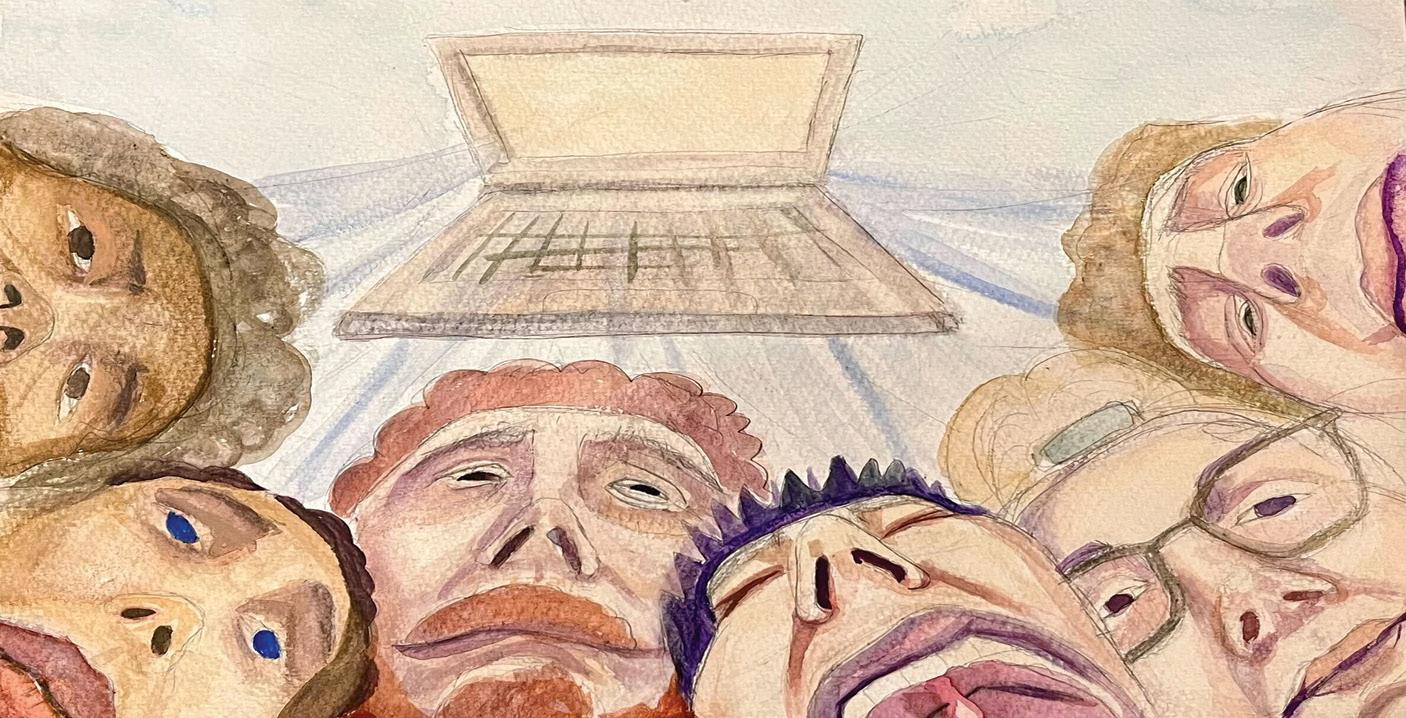
Living in the 21st century, our generation is no stranger to new technologies, as new programs and products casually enter our lives every day. However, few advancements have infltrated Stanton College Preparatory School quite like ChatGPT, an artifcial intelligence capable of writing essays, summarizing text, and replicating human creative thought. This AI technology has entered our education system in a way that threatens the integrity of our students and their writing.
ChatGPT, designed to generate essays and dialogue to fulfll virtually any prompt, has introduced a dangerous new avenue for submitting fraudulent work. In the past, plagiarism has been somewhat obvious. One quick Google search or the assistance of any plagiarism detecting service like Turnitin would uncover any work’s original source. Conversely, ChatGPT has created an opportunity for dishonesty, producing completely original work in a way that is virtually untraceable with current plagiarismchecking technology. Students’ improper use of this technology has created an obstacle for both teachers and honest students since most of our work is submitted through online platforms.
We believe the potential for plagiarism created by ChatGPT’s presence in schools is not only a danger to the integrity of our education, but also to the content of our teaching. If AI technology is capable of producing quality writing regardless of a user’s talents, the use of it in educational settings eliminates the need to teach writing skills. ChatGPT’s ability to create notes and summarize texts likewise renders reading and comprehension skills obsolete. Left unchecked, ChatGPT has the potential to create generations of students and educators lacking these basic reading and writing skills. In this way, the invention of ChatGPT
is comparable to that of the internet– forever changing the skills required of youth. With this technology at their fngertips, students can be passive observers of their own schooling, excelling without any necessity for learning or growth.
In order to prevent radical consequences to the future of education, ChatGPT’s use at Stanton and all institutions of learning must be restricted. While students should have the integrity and restraint to not employ this technology in nefarious ways, they should not have access to it in the frst place. It is the responsibility of the owners of ChatGPT to regulate their own invention, ensuring its use does not end in unintended consequences.
The implications of ChatGPT, however, extend beyond educational spheres. While AI technology represents a great advancement, capable of impressive feats in writing and art, even ethical use of this technology represents a threat to art in all forms. Being that this technology efectively replicates not only form, but also style, it easily fabricates work identical to that of a human being. This begs the question: what is creativity? What is the value of individual expression when it can be similarly produced by something without a soul? It is clear that ChatGPT could change much more than our education– it has the opportunity to change the future of artistry and our understanding of humanity itself.
As journalists, we condemn the casual use of any technology that can mimic quality writing while simultaneously being void of any originality by the writer. This potential is a threat to the authenticity and credibility of our craft. In the wrong hands, ChatGPT jeopardizes not only the state of our education system, but the future of art and human knowledge. As such, the Editorial Board is opposed to unrestricted public use of ChatGPT and its implications on the future of writing.
photo by Anusha Anna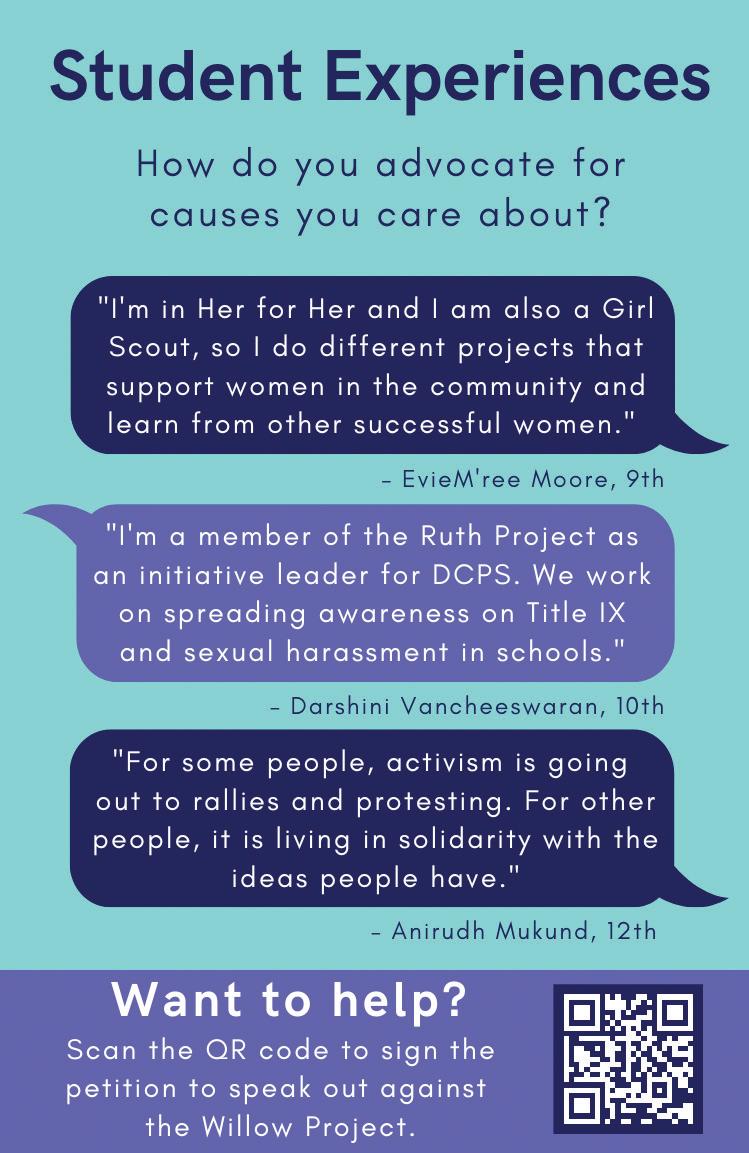
For the past few decades, climate change has remained a prevalent topic among representatives of all nations. However, there is no longer time to wait for discussions to be held –action must be taken. In the United States, there have been various programs which have signifcantly worsened climate change. One of the most recent additions is the Willow Project, which was approved by the Biden administration on March 13.
The Willow Project would consist of a series of ventures to Alaska to drill oil. Although the plan’s goal is to produce economic gains along with energy-based resources, climate activists and the general public severely disapprove of it. Evidently, the program’s drawbacks would greatly outweigh its possible benefts, resulting in environmental dilemmas.
This plan was introduced by ConocoPhillips, an Alaska-based oil company, which advocated for major drilling in newly discovered oil deposits in a rural part of Alaska. The project began in March 2023 and is planned to last 10 years, digging away at the Alaskan surface, destroying natural areas, and posing dire consequences to the environment.
By KATYA SNIRIOVA, Staf WriterAccording to the Alaska Journal of Commerce, the eventual goal would be the daily excavation of 180,000 barrels of oil. These gains would lead to over 1,000 tons of greenhouse gasses being released into the air, which would inevitably harm local ecosystems. Referring to a March 2023 ABC News article, the proposal was awaiting approval in 2020 when it was turned away due to lack of support and environmental issues. The now approved project clearly holds dangerous threats towards the inhabitants of Alaska’s natural wildland.
However, the younger generations are not permitting such an injustice to go unnoticed; many have taken to various platforms to spread awareness. Students at Stanton College Preparatory School and all around the U.S. have promoted a Change.org petition, which has already passed its intended goal of 1 million signatures and continues to grow with eager adolescents.
This is one of the many ways Stanton students engage in advocacy on social media and fght for the topics they are passionate about. The fght for the project must remain even after it has been approved, as the power of a generation can alter decisions in the near future. Without a change, Alaska and the rest of the U.S. will continue to spiral into a climate crisis, leading to irreversible damage.
even when they were prepared. This study is only one of many that highlight the growing academic pressure on students.
photo by Spurthi NrusimhadevaraAcademic validation is when students seek gratifcation based on their grades, test scores, and other academic standards. This comes from a fawed reward structure that has been ingrained into students’ heads by the education system, allowing them to fall in love with the idea of being validated and recognized by their society for their achievements. In reality, academic validation is a stressful and toxic cycle that is extremely difcult to break out of.
Students, including those at Stanton College Preparatory School, are in an environment where they feel there is always room for improvement but no room for failure. Students overlook this pressure because they perceive academic validation as a way to make school more enjoyable, by using high grades to justify their overwhelming stress.

According to a 2019 study conducted by the International Journal of Adolescence and Youth, the Organization for Economic Co-operation and Development surveyed 540,000 students ages 15 and 16 in 72 countries. They found that 66% of students worried about bad grades and 55% reported academic anxiety regarding test taking
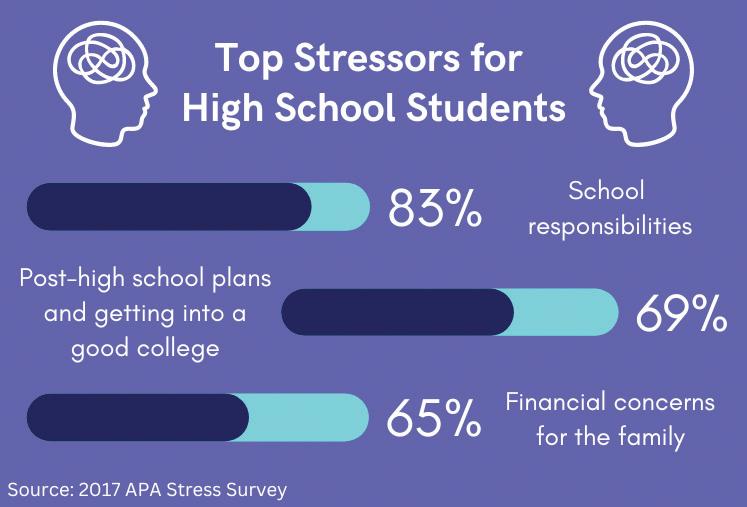
In a rapidly changing society that places increasing emphasis on education in the workforce, students will often worry about their futures and what college they will be attending. Because of this, they tend to overemphasize grades and test scores, using numbers to defne themselves and separate them from each other.
However, academic validation is often idealized on social media and in the entertainment industry. One example is in “Gossip Girl,” a popular television program from the CW Network, through one of the main characters, Blair Waldorf. She is the typical
overachiever and perfectionist with a devoted work ethic. In her entire academic career, she has always earned straight A’s and been headstrong and ambitious. But in season two of the show, Blair panics after getting a B, thinking it would squash her chances of getting into Yale. “Gossip Girl” is unrealistic because it portrays Blair getting into all sorts of fascos while still managing to land a prestigious magazine internship, maintaining a 4.0 GPA, and running a multi-million dollar business. In real life, if a student were to do what Blair did, they most likely wouldn’t have much time for anything else, and this could take a serious toll on their physical and mental health.
Blair, like many students, seeks gratifcation for her academic achievements. Because the show is so popular, it, along with other forms of media, can spread the negative impacts of academic validation. This leads to students romanticizing their academic pressure to cope with the high levels of stress that follow recognition and approval by society. Students can even glamorize the stress itself as another way to stand out. This perpetuates the cyclical toxicity of academic validation present in many schools.
